As the demand for electric vehicles (EVs) grows, so does their presence in Australia’s car market. Whether the motivation be reducing carbon emissions or saving on petrol costs, there’s one thing for sure, Aussies are ‘hooked’ on battery-powered vehicles.
But if you’re ready to ditch the fuel and try electric, what exactly are your options, the pros and cons, and importantly, what is ‘going EV’ going to cost you? To offer some guidance, Canstar Blue has produced this list of the main electric car and plug-in hybrid electric vehicles (PHEVs) you’ll find in Australia, comparing them on their price, range, battery size and other specs.
List of Electric Vehicles in Australia
Here is a list of the most prominent electric vehicles available to buy in Australia, listed in alphabetical order:
- BMW i3/i3s
- Hyundai IONIQ EV
- Hyundai IONIQ PHEV
- Hyundai Kona
- Jaguar I-Pace
- Kia Niro EV
- Mitsubishi Outlander PHEV
- Nissan Leaf
- Renault Zoe
- Tesla Model S
- Tesla Model X
Electric cars in Australia – quick comparison
Beginning with the most expensive, here are the electric vehicles currently available for sale in Australia, as well as a few to be released during 2019. Prices and ranges should be considered estimates as only. Figures have been sourced from each brand’s respective website.
| Model | Prices From* | Battery Size | Range |
|---|---|---|---|
| Tesla Model X | $150,000 | 100 kWh | 594km |
| Jaguar I-Pace | $119,000 | 90 kWh | 470km |
| Tesla Model S | $105,000 | 75 kWh | 565km |
| BMW i3/i3s | $68,700 | 33 kWh | 260km |
| Hyundai Kona | $59,990 | 64 kWh | 449km |
| Nissan Leaf | $54,482 | 40 kWh | 270km |
| Renault Zoe | $47,490 | 40 kWh | 300km |
| Mitsubishi Outlander PHEV | $45,990 | 12 kWh | 54km+petrol |
| Hyundai IONIQ EV | $44,990 | 28 kWh | 230km |
| Hyundai IONIQ PHEV | $40,990 | 8.9 kWh | 50km+petrol |
| Kia Niro EV | TBC | 64 kWh | 455km |
*Where pricing info is unavailable on the manufacturer’s website, prices have been sourced from carsguide.com.au. This should be used as a starter guide and not considered an actual quote.
Electric Car Brands and Features
Thousands of Australians are choosing electric cars over their petrol-fuelled counterparts, and with most coming with a decent price tag, it’s probably best you know what you’re buying. Here are the most common EV and PHEV cars to hit Aussie shores in 2019.
BMW i3/i3s
The BMW i3 is BMW’s first mass-produced completely electric vehicle. It’s a high-roof hatchback with an underfloor Li-ion battery back and optional range extender.
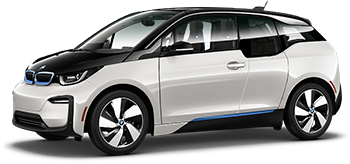
- Models available: 60Ah, 94Ah, 120Ah, S 120Ah
- Price from: $68,700
- Charge time: 4:18 with BMW i Wallbox Plus, 20:06 with power socket
- Max range on biggest battery: 260km
- Additional specs: 0-100km in 7.3 seconds, optional range extender, sustainably-sourced interiors
Shopping for tyres?
Hyundai IONIQ Electric
In 2018, the Hyundai IONIQ became Australia’s cheapest electric car, boasting a decent range and quick charge time. This five-door hatchback has quickly become one of the best-selling EVs on the market.
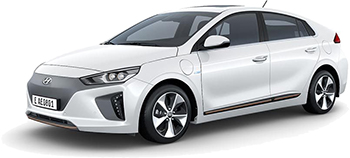
- Models available: Electric Elite, Electric Premium
- Price from: $44,990
- Charge time: 4:25 with a Delta in-home charger, or 23 minutes to 80% charge at a fast charge station
- Max distance travelled on battery: 230km
- Additional specs: Smart mobile charging, heated and ventilated seats, push button start, eight-year battery warranty
Hyundai IONIQ Plug-In Hybrid
Much like the electric version of this car, the plug-in hybrid is the cheapest model available in its category. It comes with a slightly cheaper price-tag, and naturally smaller battery which delivers a modest EV-only range.
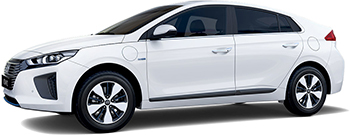
- Models available: Plug-In Hybrid Elite, Plug-In Hybrid Premium
- Price from: $40,990
- Charge time: 2:15 to fully charge with a home charger
- Max distance travelled on battery: 50km+ petrol
- Additional specs: Switch between pure electric or hybrid mode, smart charging, heated and ventilated seats, push button start, eight-year battery warranty
Hyundai Kona Electric
The Hyundai Kona Electric car is claimed to be Australia’s first 100% electric small SUV, that is “perfect for daily commutes or adventures”. In comparison to the IONIQ, it’s got almost twice the range – but is almost twice the price, too!
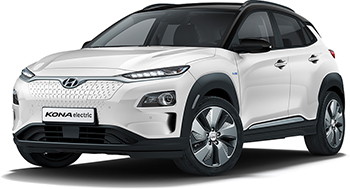
- Models available: Elite, Highlander
- Price from: $59,990
- Charge time: 80% battery in 54 minutes with a 100kW fast charger
- Max distance travelled on battery: 449km
- Additional specs: 0-100km in 9.9 seconds, Infinity Audio system, 8” touch screen display, glass sunroof
Jaguar I-PACE
Its first all-electric vehicle, the I-Pace is a high-end SUV with a price tag that suits the Jaguar name. Here are the specs of this car:
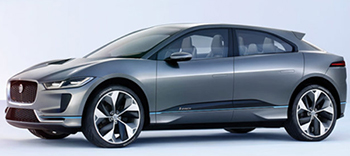
- Models available: S, SE, HSE, First Edition
- Price from: $119,000
- Charge time: 270km/hour charge with 50kW DC rapid charger
- Max distance travelled on battery: 470km
- Additional specs: 0-100km in 4.8 seconds, in-built Navigation Pro, noise reducing acoustic laminated glass
Kia Niro EV
The Kia Niro SUV joins a spate of electric vehicles entering the market this year. Whilst the details of the car still remain speculative, here’s a rough idea of what you might expect from Kia’s first EV.
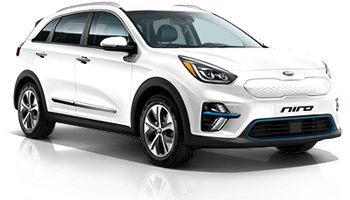
- Models available: 39kWh, 64kWh
- Price from: TBC
- Charge time: 80% battery in 54 minutes with a 100kW fast charger
- Max distance travelled on battery: 455km
- Additional specs: 0-100km in 7.8 seconds
Mitsubishi Outlander PHEV
The Mitsubishi Outlander PHEV is a plug-in hybrid SUV that’s pretty mid-range as far as electric vehicles go. Apparently one of Australia’s ‘most popular’ hybrids, it combines the quietness and environmental performance of an EV, with the practicality of an SUV.
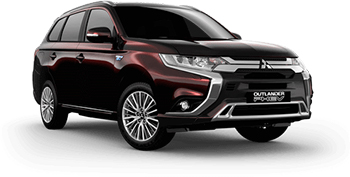
- Models available: PHEV ES, PHEV ES ADAS, PHEV EXCEED
- Price from: $45,990
- Charge time: 6:30 with AC 240V, 10A port
- Max distance travelled on battery: 54km+ petrol
- Additional specs: 18-inch alloy wheels, One Touch Start System, reversing camera, climate control dual zone air-con
Nissan Leaf
One of the most highly anticipated electric cars to become available in Australia in 2019, the Nissan Leaf is expected to make its grand entrance into the Aussie market towards the end of the year. It’s a five-seat compact hatchback that was first released overseas in 2010.
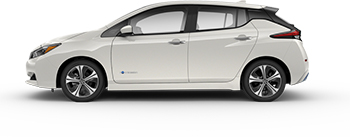
- Models available: S, SV Plus, SL Plus
- Price from: $54,482
- Charge time: 20% to 80% in 60 minutes with a CHAdeMO rapid charger
- Max distance travelled on battery: 270km
- Additional specs: Auto-dimming rear-view mirror, heated leather seats and steering wheel, seven-speaker Bose Energy Efficient audio
Renault Zoe
In 2018, French manufacturer Renault introduced a completely electric hatchback model to the Australian EV market. It’s roughly the size of a Mazda 2, but double the price. Here’s what you can expect:
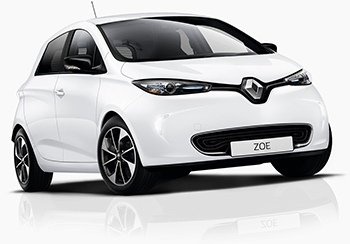
- Models available: INTENS, LIFE
- Price from: $47,490
- Charge time: Full recharge in as little as 3 hours with 22kW
- Max distance travelled on battery: 300km
- Additional specs: 7” touchscreen multimedia navigation system, rear parking sensors and camera, 16” alloy wheels.
You may also be interested in:
Tesla Model S
Tesla is a well-known luxury electric car retailer that was co-founded by Elon Musk. The Model S is a 5-door ‘liftback’ that holds a 100kWh battery pack, which is more than any other electric car.

- Models available: 60, 70, 70D, 75, 75D, 85, 85D, 100D, P85, P85D, P90D, P100D
- Price from: $105,000
- Charge time: 40 minutes to 80% at a Supercharger station
- Max distance travelled on battery: 594km
- Additional specs: 0-100km in 2.6 seconds, adaptive lighting, 17-inch touchscreen, keyless entry
Tesla Model X
Similar to the Model S, the Tesla Model X is a luxury fully electric car with an impressive range and sleek styling. This car is a mid-size SUV with specs as listed below.

- Models available: 75D, 100D, P90D, P100D
- Price from: $150,000
- Charge time: from 20% to 80% in 1 hour at a Supercharger station
- Max distance travelled on battery: 565km
- Additional specs: 0-100km in 3 seconds, seven-seat all-wheel drive, active safety technology, falcon wings
Second-hand electric cars Australia
When it comes to buying a used electric car, many of the same rules as when you buy a run-of-the-mill second-hand car apply. Checking the state of the interior and exterior, mileage and the car’s service history are always going to be important, but there are a few ‘EV specific’ things to keep in mind also:
- Battery performance: As batteries in all applications do, electric vehicles batteries can diminish in quality over time. Have a chat to the seller to see how far the battery will get you between charges.
- Resale value: When it comes to the car’s value, you’ve got to keep in mind that the demand for electric cars is less than their fuel-powered counterparts, and therefore you may struggle to sell it at a decent price. What this means though, is that with a little bit of haggling you may be able to score a better deal from the get-go.
- Your commitment to charging: This, again, applies regardless of a second-hand or brand-new sale, but should still be something to take into consideration. Where petrol stations are at every corner, charging stations may not be, making it harder for you to ‘fill-up’ when you need to.
Visit our electric vehicle running costs guide for more info on how much electric cars tend to cost, how much they can save you and what to consider before buying one.
A final note on electric cars in Australia
The Australian electric car market is long overdue for a boom, and there’s speculation that a serious spike in EV purchases will be happening in the coming years. The list above details the vehicles currently available for purchase, as well as a few expected to show up on the scene in 2019. Remember that this is a rough guide only – and that if you’re in the market for a new car, it’s best to do your own research. Happy shopping!
Image credit: Scharfsinn/shutterstock.com, bmw.com.au, kia.com.au, hyundai.com.au, jaguar.com.au, mitsubishi.com.au, nissan.com.au, renault.com.au, tesla.com.au



Share this article